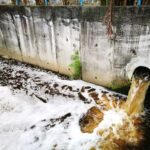40 tonnes of bee-harming neonics a year flow through Asia’s longest river
More than 40 tonnes of bee-harming neonicotinoid insecticides, known as neonics, have been estimated to be flowing through Asia’s longest river every year, according...
Landmark sewage ruling means water companies could face legal challenges over spills
A landmark Supreme Court judgment on 2 July could open up new legal avenues for water companies to be sued for sewage dumping incidents....
Pharma pollution alarm
In an article published in Nature Sustainability, researchers warn that discharges to the environment during drug production, use and disposal have resulted in ecosystems...
Call to make London a ‘sponge city’
London will need to urgently become a ‘sponge city’ – a city better designed to absorb and hold rainwater – in order to ward...
New approach to monitoring freshwater quality can identify sources of pollution, and predict their...
The source of pollutants in rivers and freshwater lakes can now be identified using a comprehensive new water quality analysis, according to scientists at...
Utilities should prepare ahead of mandatory monitoring
Healthier rivers will be one outcome of implementation of the Environment Act 21, writes Darren Hanson of water technology firm Xylem. Now water companies...
Innovation would help find more chemicals in water, say conference speakers
At the British Water Micropollutants Conference 2024, which took place in London on 8 February, keynote speakers from the UK's Environment Agency called for...
Comment: PFAS removal – we already have the technology
The issue of PFAS contamination of drinking water sources has been under the media spotlight in recent weeks, scrutiny that is likely to increase...
Comment: Agriculture and pharma key to solving micropollutants problem
In the face of growing public concern about the presence of micropollutants in water and wastewater, Dr Pablo Campo Moreno identifies initiatives that he...
Trade effluent monitoring in Essex
This article contains paid for content produced in collaboration with Pollution & Process Monitoring (PPM).
Pollution & Process Monitoring (PPM) has engineered a bespoke analytical...
Do or dye: Synthetic colours in wastewater pose a threat to food chains worldwide
The ecological and health threats of synthetic dyes entering wastewater systems have been detailed in a new study, which calls for new laws worldwide...
How to eliminate the risk and mess of polymer spills
Polymers play a key role at municipal/industrial water and wastewater treatment plants, but also bring the risk of major disruption and extra expense if...
A new kind of online tool launches to tackle road runoff pollution
A new online tool highlights where opportunities exist to install nature-based solutions, such as wetlands, to tackle road runoff pollution before it ends up in...
New study finds that sewage release is worse for rivers than agriculture
New research by the University of Oxford seems to reveal that sewage discharge into rivers has a greater impact on water quality, and the...
Growing demand for storm overflow cameras
Water companies are now legally obliged to publish data on their storm overflows, but many of these discharge points are also increasingly being monitored...
UK government’s attempt to loosen nutrient neutrality rules blocked by the House of Lords
The government has lost its bid to scrap nutrient neutrality rules for housing developments, with Labour Lords voting to reject the proposed amendments (to...
Oxidation approach to destroying PFAS demonstrated at US facility
General Atomics Electromagnetic Systems (GA-EMS) conducted live demonstrations of its industrial Supercritical Water Oxidation (iSCWO) system for destroying PFAS chemicals before a delegation of...
Licence to spill? Legislative status of government’s new plans unclear
River conservation groups reacted with alarm to the news (on 29 August) that the government plans to ease restrictions on developers' need to ensure...
Tannins: A possible answer to microplastic pollution?
Scientists at UBC’s BioProducts Institute find that if you add tannins to a layer of wood dust, you can create a filter that traps virtually all...
EA launches consultation on unlimited fines for the worst polluters
New laws will scrap the cap on civil penalties and significantly broaden their scope to target a much wider range of environmental offences
On 15...






















